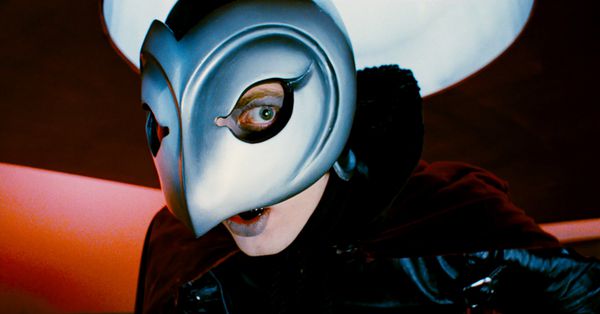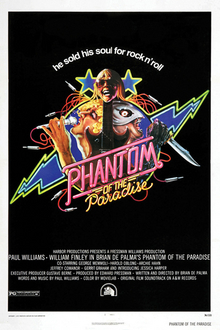Eye For Film >> Movies >> Phantom Of The Paradise (1974) Film Review
Phantom Of The Paradise
Reviewed by: Andrew Robertson

"I didn't make him for you!" is the line from The Rocky Horror Picture Show and it's as true of Frank and Rocky and the eponymous film as it is of The Phantom Of The Paradise. Counting among its fans film-makers like Brian De Palma and Edgar Wright, it's a film whose cult following is a testament to its invention and the singularity of its intent.
50 years later it's still impressive that anyone thought it fit to run The Phantom Of The Opera and Faust and the Hunchback of Notre Dame and The Portrait Of Dorian Gray through a blender and garnish it with sex and drugs and rock and roll and, most importantly, make it a musical. The variety displayed here is more than just show. In its depiction of the business there are few holds barred. To take something as weirdly pure and hammer it into a profit-making enterprise is some challenge, and one that the film didn't manage historically.

That doesn't mean it's a failure. There are few forms of entertainment where audiences care about return on someone else's investment, but film is often one. Outwith FIFA's financial fair play rules no fan cares about their team's balance-sheet, just their score-sheet. The score here is by Paul Williams, a song-writer whose film career started here. He'd go on to write Bugsy Malone, and you can hear similarities in some of the piano elements. He'd also later win an Oscar and a Grammy for Evergreen which Barbara Streisand sang in A Star Is Born, and the differently green Rainbow Connection for The Muppet Movie.
He stars as Swan, a record producer whose firm's name had to be (sometimes clumsily) obfuscated after legal pressure from Led Zeppelin. Swan Song became Death Records. If you're lucky enough to catch it on a big screen you can see some of those not covered up by the processes available at the time. It is more than the technical elements that are of the era. William Finley's Winslow's songs and style have more than a touch of Elton John. The bikers as security with 'Death' among their colours are less than five years past the Altamont Free Concert. Gerrit Graham's Beef is a herald of glam, a harbinger of the New York scene that'll give us acts like Richard Hell and the Ramones. Nostalgia's time is over, Swan says, and he'll be right again. Among the bands that were playing CBGBs were Television and that's a feature too. Swan knows what's entertainment, and he's not wrong.
He's also not for everyone. Cult classics, and we're talking about one, aren't so much an acquired taste as a flavour seeking the right buds. Souls aren't soil, far from as uniform. A seed that'll flourish in one field will leave another found fallow. That's one of the joys of works like this though, their blossoming is a blessing. Again and again there are elements that will be echoed in later works, mirrors and masks and little friends, split screens and thrills and untimely ends. There's even some aerial adventure, and while some of the effects now look a little clumsy, their effects are still compelling.
Swan is looking for the new sound. He might have found it in Winslow and Winslow might have found it in Phoenix (Jessica Harper) but there's more complexity to come.
In 1976 the Sex Pistols played two gigs at Manchester's Lesser Free Trade Hall. Those concerts are legend, part of the origin myths of any quantity of subsequent filth and fury. They weren't Charles Atlas approved, but they weren't for everyone either. What they were though was influential, they spoke to an audience. Brian Eno said he believed everyone who bought The Velvet Underground's first record started a band, and 'the gig that changed the world' was similarly impactful.
I'd argue that The Phantom Of The Paradise was too. It's an early work for any number of folk, but the impact includes those not on screen. Eagle-eyed viewers might clock Sissy Spacek (who'd later star in De Palma's Carrie) was a set dresser. Among those who watched and wondered were several film-makers. Del Toro had his copy of the soundtrack signed by Williams at a concert in Mexico. Without this Phantom I'm not sure that other high concept works would have followed. It's a film that's so intent on being itself that it manages to capture The Shape Of Water, to find a route to Pan's Labyrinth. That navigation gives us Baby Driver and perhaps even The Sparks Brothers, though their musical career was already well established. It's haunting that we don't get more films that are as unabashedly themselves. It's one of the things that makes the film such a delight to those sufficiently attuned. With anniversary screenings in a few places, if any of that pricks up your ears here's a ghost of a chance you'll find it heavenly.
Reviewed on: 24 Sep 2024















